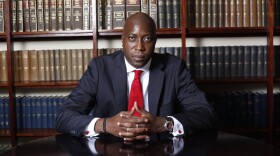ST. CROIX — President Donald Trump’s plan to take ownership of the Gaza Strip and forcibly relocate about 2 million Palestinians to neighboring Arab countries has been criticized by the president of the Virgin Islands-Palestinian Friendship Association, who emphasized the importance of a two-state solution and the right of displaced Palestinians to return to their homes.
After Hamas and other Palestinian militant groups launched a surprise attack against Israel from the Gaza Strip on October 7, 2023, Israel declared itself in a state of war that reduced much of the area to ruins. A multiphase ceasefire agreement that commits Hamas and Israel to end the war in Gaza was reached last month.
Trump discussed redeveloping the war-torn territory into what he described as the “Riviera of the Middle East” during a joint press conference with Israeli Prime Minister Benjamin Netanyahu Tuesday at the White House. He spoke of removing the destroyed buildings, creating an economic development that will “supply unlimited numbers of jobs and housing for the people of the area.”
“The U.S. will take over the Gaza Strip and we will do a job with it too,” Trump said. “We’ll own it and be responsible for dismantling all of the dangerous unexploded bombs and other weapons on the site.”
Ahmad Hussein, Virgin Islands-Palestinian Friendship Association president, said if Trump’s plan comes to fruition, it will cause disorder and problems in the Middle East that will have a domino effect worldwide.
“It’s not realistic, it’s not possible, it’s not logical,” he said. “It represents a colonial settler ideology that is very dangerous. That kind of mentality is very dangerous for world peace and stability.”

Hussein supports an outcome in which Palestinians return to their homes and rebuild their lives. He said anybody in the world should have the right to access and peacefully enjoy their homes, along with practicing all their civil, human, political, and religious rights.
“These are universal rights,” he said.
Palestinians were displaced from their homeland over 75 years ago.
The 1948 Arab-Israeli War from May 15, 1948 to July 20, 1949 is remembered as the War of Independence for Israel because it secured the country’s existence. The war is remembered by Arabs as “the Nakba” (from Arabic al-nakbah, “the catastrophe”) because of the mass displacement of Palestinians. The Six-Day War from June 5 to 10, 1967 created hundreds of thousands of refugees and brought more than 1 million Palestinians in the Occupied Palestinian Territory under Israeli rule. The occupied territories include the West Bank, East Jerusalem, and the Gaza Strip. The West Bank and Gaza Strip, or simply Gaza, are the two Palestinian territories that make up the State of Palestine.
In addition to the Arab-Israeli War and the Six-Day War, Israel has fought several conflicts with various Arab forces, including in 1956, 1973, 1982, 2006, and 2023 to present. The UN General Assembly voted overwhelmingly on September 18, 2024 to adopt a resolution demanding that Israel “brings to an end without delay its unlawful presence” in the Occupied Palestinian Territory.
Palestine was governed by Great Britain from 1922 to 1947. As Jewish immigration to the region increased in 1922, tensions grew between Arabs and Jews. The UN General Assembly passed Resolution 181 in 1947, calling for the partition of Palestine into Arab and Jewish states. The resolution, which was rejected by the Arab community in opposition to the establishment of a Jewish state, was considered by the Jewish community in Palestine to be a legal basis for the establishment of Israel.
In 1993, the Israeli government and the Palestine Liberation Organization agreed on a plan to implement a two-state solution, a proposed framework aimed at resolving the Israeli-Palestinian conflict by establishing two independent states — Israel for the Jewish people and Palestine for the Palestinian people.
Hussein supports a two-state solution and an end to Israel’s presence in the Occupied Palestinian Territory.
“The problem is not the Palestinian people; it is the occupation,” he said. “The first day of peace is the day after the occupation ends.”















